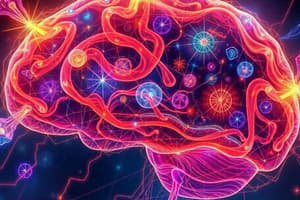Podcast
Questions and Answers
What is the response that prepares the body for fight or flight?
What is the response that prepares the body for fight or flight?
- Flexibility response
- Stress response (correct)
- Relaxation response
- Stamina response
What is a physical health problem that can be caused by chronic stress?
What is a physical health problem that can be caused by chronic stress?
- High blood pressure (correct)
- Obesity
- Tendonitis
- Muscle strain
What is the term for the ability to bend, stretch, twist, or reach out with the body, arms, and/or legs?
What is the term for the ability to bend, stretch, twist, or reach out with the body, arms, and/or legs?
- Physical strength
- Extent flexibility (correct)
- Stamina
- Endurance
What is the term for the ability to exert oneself physically over long periods of time without getting winded or out of breath?
What is the term for the ability to exert oneself physically over long periods of time without getting winded or out of breath?
What is the branch of psychology that studies the relationship between physical and mental health?
What is the branch of psychology that studies the relationship between physical and mental health?
What is the main focus of Physiological/Biological Psychology?
What is the main focus of Physiological/Biological Psychology?
What is the primary function of the central nervous system?
What is the primary function of the central nervous system?
Which of the following hormones is associated with mood regulation?
Which of the following hormones is associated with mood regulation?
What is the name of the system that includes the brain and spinal cord?
What is the name of the system that includes the brain and spinal cord?
What is the body's response to stress known as?
What is the body's response to stress known as?
Which of the following is NOT a function of the peripheral nervous system?
Which of the following is NOT a function of the peripheral nervous system?
Study Notes
Physiological/Biological Psychology
Physiological/biological psychology is a field of psychology that studies the physical processes and functions of the human body and how they relate to mental processes and behavior. This includes the study of the nervous system, hormones, and other biological factors that influence behavior and mental processes.
Nervous System
The nervous system is responsible for controlling and coordinating all functions of the body and is crucial for the functioning of the brain. It consists of the central nervous system (CNS) and the peripheral nervous system (PNS). The CNS includes the brain and spinal cord and is responsible for processing sensory information, generating motor responses, and controlling internal bodily functions. The PNS includes all the nerves that connect the CNS to the rest of the body.
Hormones
Hormones are chemical messengers produced by glands in the body that help regulate various functions, including growth, metabolism, and reproduction. Several hormones play a role in the regulation of mood and behavior, such as serotonin, dopamine, and cortisol.
Stress and Physiological Responses
Stress is a physiological and psychological response to a perceived threat or challenge. The body's response to stress, known as the stress response, involves the activation of the sympathetic nervous system and the release of stress hormones like cortisol and adrenaline. This response prepares the body for fight or flight, increasing heart rate, blood pressure, and muscle tension.
Physical and Mental Health
Physiological/biological psychology also plays a crucial role in understanding the relationship between physical and mental health. For example, chronic stress can lead to a variety of physical health problems, such as high blood pressure, heart disease, and diabetes.
Stamina and Extent Flexibility
Stamina and extent flexibility are two physical abilities related to physiological/biological psychology. Stamina refers to the ability to exert oneself physically over long periods of time without getting winded or out of breath. Extent flexibility refers to the ability to bend, stretch, twist, or reach out with the body, arms, and/or legs. These abilities are important for various occupations and can influence an individual's overall health and well-being.
Studying That Suits You
Use AI to generate personalized quizzes and flashcards to suit your learning preferences.
Description
Test your understanding of physiological/biological psychology, covering the nervous system, hormones, stress responses, and the impact on physical and mental health. Learn how biological factors influence behavior and mental processes.




